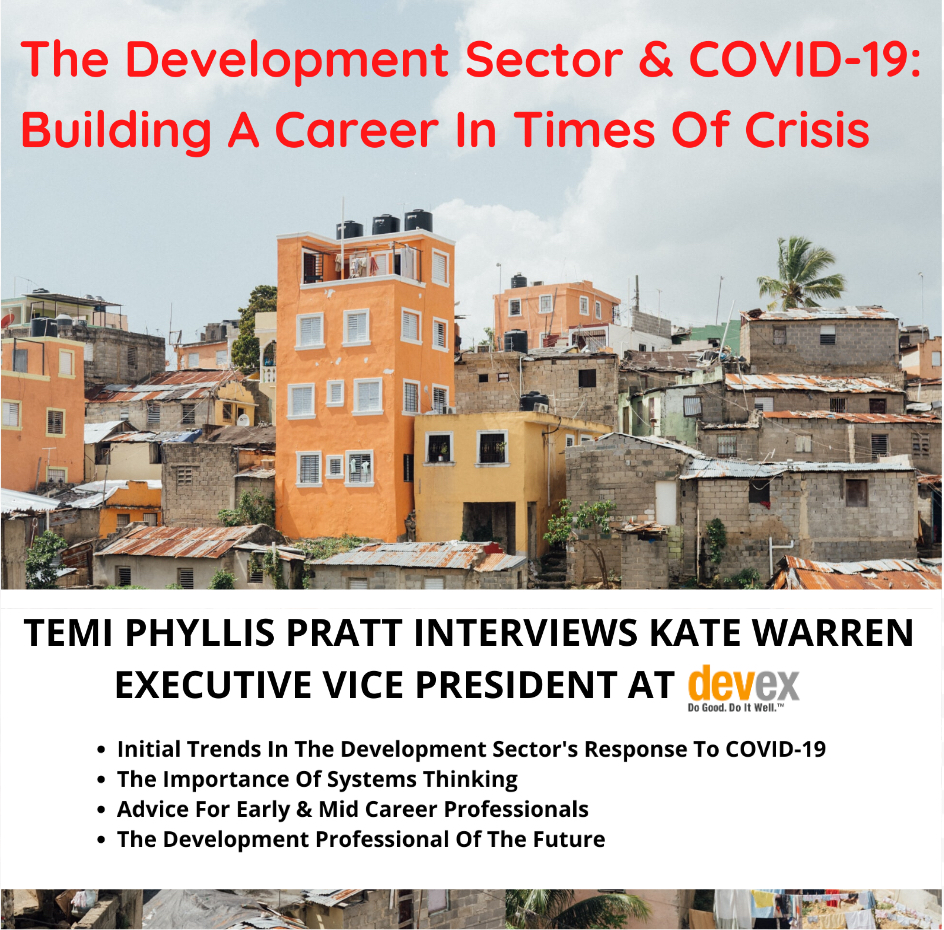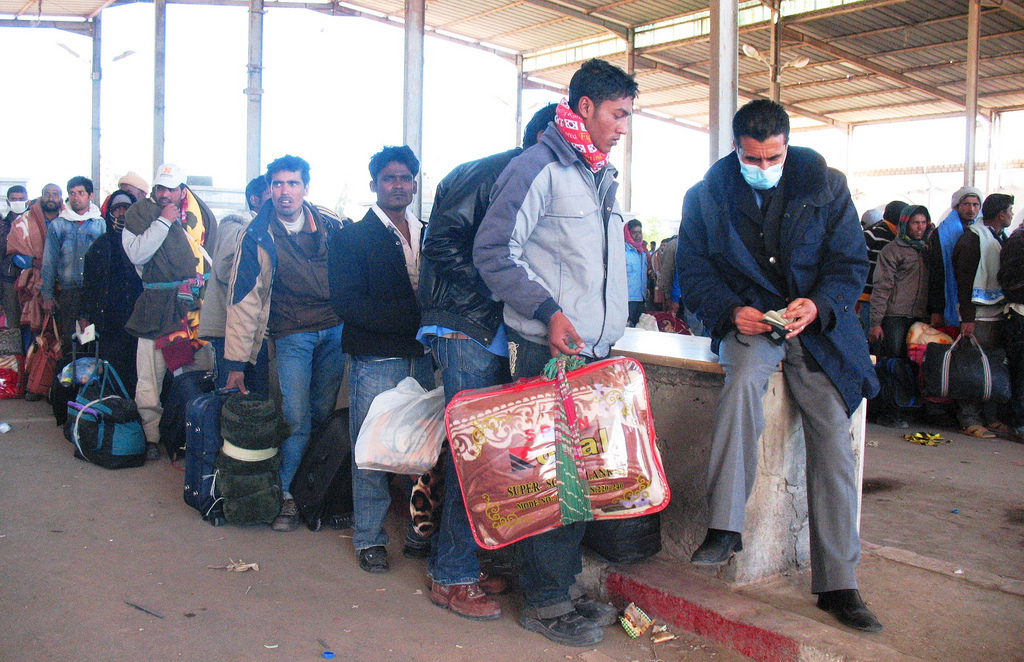On Friday 19 October, the second speaker of the International Development Department’s Cutting Edge Issues in Development Thinking and Practice lecture series, Kate Raworth (@KateRaworth), delivered a compelling talk about “Doughnut Economics and Development”. Here’s what three of the Department’s students took away from her lecture.
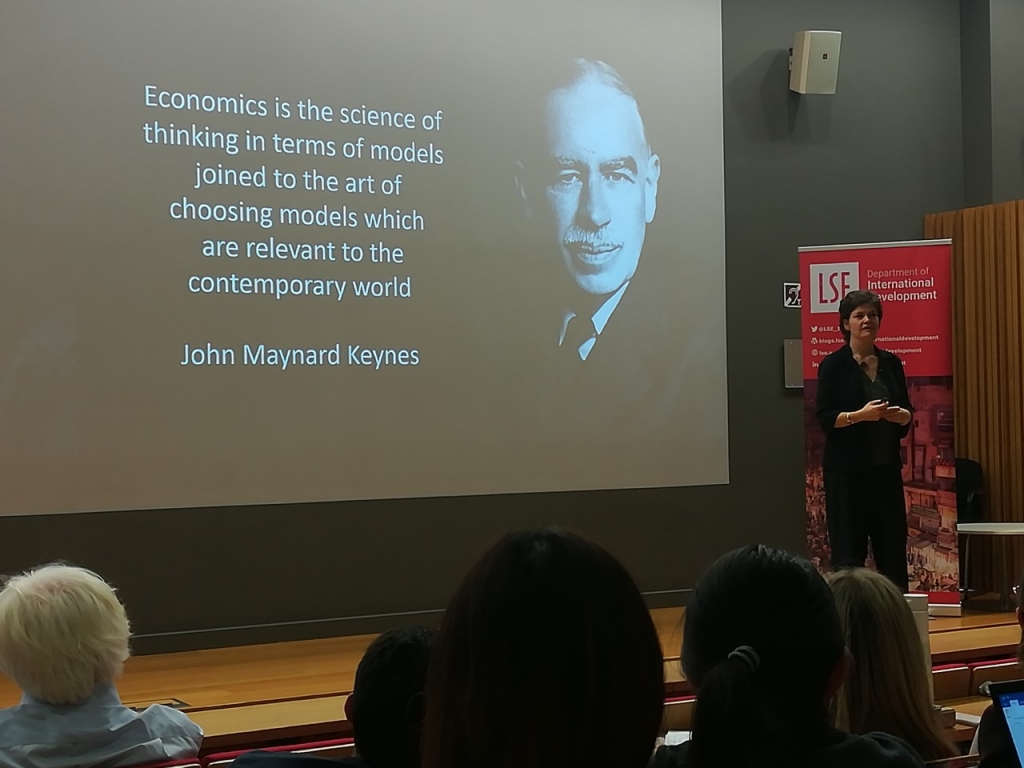
“We’re all developing countries now.” That is the phrase that most stood out to me during Kate Raworth’s lecture on Doughnut Economics, and not for a lack of quotable expressions. This perspective is born out of her economic model that redefines the purpose of economics as living and operating within the boundaries of our natural planet while still providing basic services and opportunities to all of society. In this sense, what we commonly call developing countries can be seen as such because they tend to not meet basic social standards, while what we refer to as developed countries are revoked of this status because they fail to live within their ecological limits.
This statement was accompanied by different doughnut diagrams illustrating the deficiencies in terms of the development of ‘developed’ countries, as they wildly surpassed their planetary boundaries. Especially powerful about such images and statements is that it emphasizes the responsibility of rich countries to actively engage with current global problems. It is tempting for ‘developed’ states to refer problems of for example climate change to the countries and people that are most affected by it. This model shifts the burden of adaptation and change to the perpetrators as opposed to the victims, as rich states are no longer seen as having reached the finish line.
In this idea, however, also lies the biggest challenge of doughnut economics overall. Both the discourse of developing and developed states, and the discourse of growth economics are deeply embedded in virtually all spheres of public life. Moving towards the inclusive and regenerative economy Raworth envisions implies a cognitive change within a majority of people, especially among the most powerful. Despite its conceptual strength, the doughnut model fails to explain how such a transformation can be managed. Accordingly, the biggest challenge for ‘Raworthian’ reformers of the economic and environmental system alike is to find a way to change worldviews. Doesn’t that sound like an easy task?
Melle van Hilten is an MSc Development Management student at the LSE, and a graduate of Leiden University College. Her primary research interests are the intersections between poverty and environmental challenges, as well as the localization of aid and resource management.
_______________
In a compelling lecture, Kate Raworth from Oxford University’s Environmental Change Institute teaches us “how to think like a 21st century economist” by deconstructing the basic premises of mainstream economics:
- the supply and demand curve, which transpires economists’ unrealistic obsession with hypothetical equilibria;
- the rational ‘homo economicus’, which limits human nature to selfishness and insatiability;
- the circular flow diagram, which misrepresents the real world by dismissing elements such as unpaid care, energy and the commons as futile to production.
It becomes quite clear that Raworth’s criticism is centred on the fact that GDP growth has been the dominant political objective of the past few decades. Indeed, Raworth’s main conclusion is that our economies need to make us thrive, whether or not they actually grow.
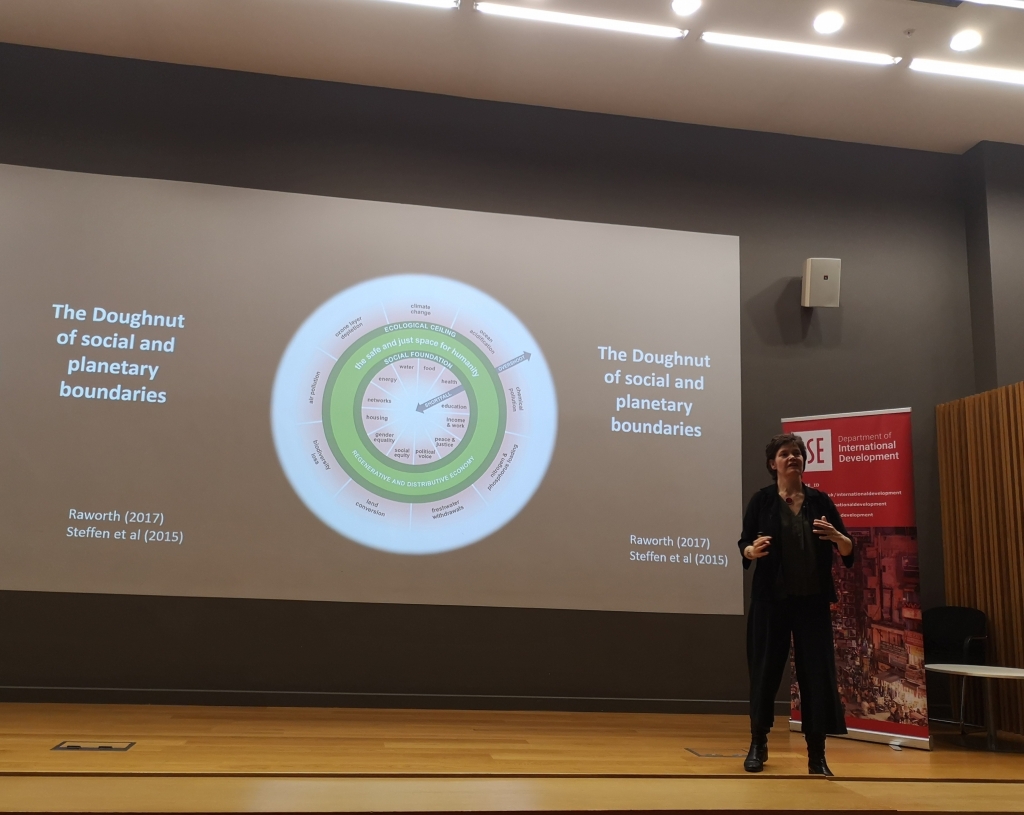
In the aim of making the invisible elements in mainstream economics visible, Kate Raworth conceptualises 21st century human prosperity as a multidisciplinary “doughnut of social and planetary boundaries”, the inner circle of which represents the social foundations for well-being. The outer circle then denotes the ecological boundary of planetary degradation, and the doughnut itself designates the ‘safe and just space for humanity’. In order to stay within the doughnut, we should think about the economy in terms of design principles: we need productive processes that are distributive and regenerative. Different examples illustrate the potential for such a future: off-grid renewable energy systems, open source software and digital knowledge sharing solutions, the recent proliferation of fab labs and the circular economy’s projected expansion into untapped services.
Although Kate Raworth convincingly presents her doughnut as a comprehensive approach to assessing the state of the economy and of humanity, the path for a global transition to such an approach seems less clear. Specific characteristics of distributive and regenerative processes are given –without any real policy advice on how to address the previously identified issues. It is as if Raworth herself underestimates the radicalism of her propositions. What is clear, however, is the extent to which this lecture prompts interest and controversy amongst the attendees. The latter’s set of questions range from how, then, is capitalism to be reformed; how is her vision compatible with businesses’ profit-making incentive; and many simply ask for her opinion on specific matters –indeed all queries uncovered a sense of fascination and urgency. One question, however, remains unanswered: can the doughnut approach replace mainstream economic thought –or is it merely a synthesis of existing heterodox paradigms?
Celine Zins is a part-time MSc Development Management student at the LSE, while working in environmental compliance and macroeconomic research for an EPC contractor. A Development Economics graduate from the School of Oriental and African Studies (SOAS), Celine’s interests include the history of growth and competition theories, as well as the nexus between development and environmental degradation.
_______________
The widening gap between the environment and the economy has been the subject of discussion in recent years, with much debate on how it can most effectively be curtailed. Human prosperity should be measured by how effectively societies are meeting their needs without straining planetary resources. This requires a structural change in global market dynamics, with a synonymous shift in thinking. Raworth, in her convincing lecture, argues that we need to “leave behind the concept of endless growth, and focus on health and wellbeing.”
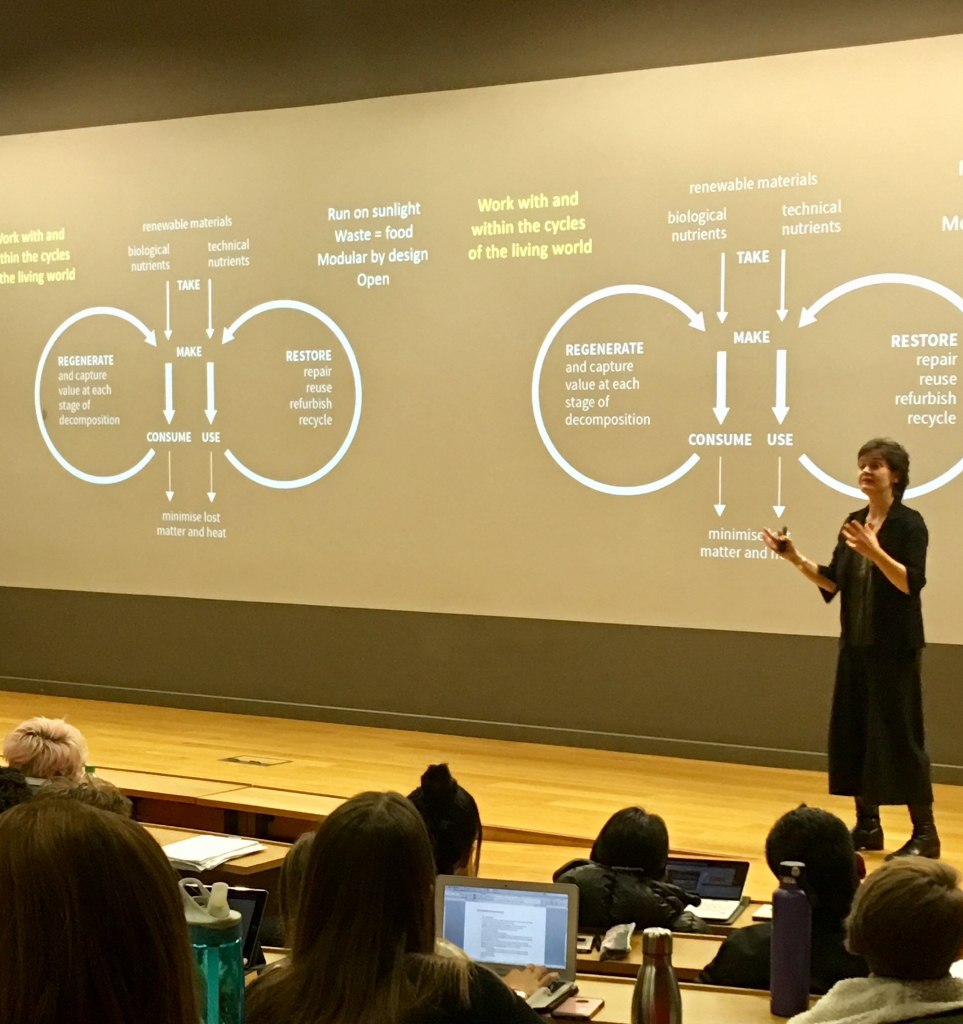
Raworth depicts the ideal state of humanity to be within the metaphorical doughnut, by upholding economic principles of design that are both distributive and regenerative. To overcome the “degrading, divided, and divisive” dynamic of the global economy (or avoid being in the ‘doughnut hole’), it is our responsibility to distribute value to the community, while working within the world’s renewable energy systems. This is seemingly the case when examining countries like China and India, who are leading the way in terms of solar and wind power installations, while more developed countries lag behind.
However, Raworth doesn’t provide a clear picture of what a future with zero reliance on fossil fuels would look like, and how this could be administered successfully in countries across all income levels. Although her view on how mainstream economics requires a transformation is compelling, it is unclear how these somewhat idealistic principles can be incorporated into structured policies in the modern world.
Unsia Hussain is an MSc Development Studies student. She graduated from the Philosophy, Politics and Economics programme at the University of Reading. Her research interests include social and economic inequalities in South Asia and the link between gender mainstreaming and social inclusion.
This week: On Friday 26 October, Rory Stewart, Minister of State for the Ministry of Justice, will be speaking on “The International Response to Fragile/Conflict States”. The lecture takes place from 4-6pm in the Sheikh Zayed Theatre in the New Academic Building at the LSE. External guests, please reserve your place, please contact s.m.neuenschwander@lse.ac.uk.
The views expressed in this post are those of the author and in no way reflect those of the International Development LSE blog or the London School of Economics and Political Science.


